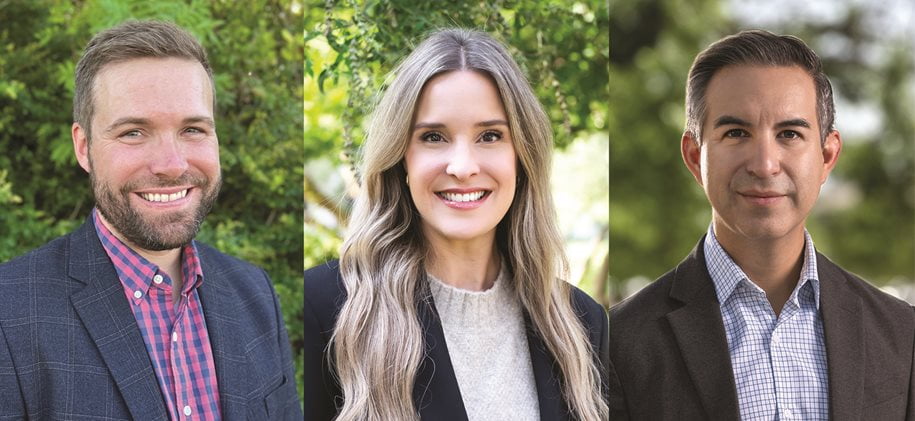Life Sciences Building, Room 206
501 S. Nedderman Drive
Box 19047
Arlington, TX 76019
Psychology researchers working to improve ethics education in social sciences

Department of Psychology faculty members Logan Watts, Michelle Martín-Raugh, and Larry Martinez, from left.
A team of psychology researchers at The University of Texas at Arlington has received a federal grant to develop and evaluate new training methods to enhance the ethical decision-making skills of early-career researchers in the social sciences. Logan Watts, assistant professor of psychology, is principal investigator of the study, titled “Development of Video-based Situational Judgment Tests for Training Ethical Reasoning Strategies”. It is being funded by a two-year, $376,924 grant from the National Science Foundation. Watts is joined on the project by co-investigators Michelle Martín-Raugh, assistant professor of psychology, and Larry Martinez, the A. Dale Thompson Endowed Chair of Leadership. There is a need to develop more robust and innovative training techniques to strengthen ethics decision-making skills for students and early-career researchers in the social sciences, Watts said. A number of unethical issues can arise in the course of research and ensuing publication of results, including falsification or fabrication of data, conflicts of interest, plagiarism, and bias in experimental design or interpretation of data. “Through this project, we ultimately hope to improve the future of ethics education in the social sciences,” Watts said. “If we can enhance how undergraduate and graduate students are trained in research ethics, and do this in a scalable way, we have the opportunity to better prepare early-career researchers to face future ethical challenges at UTA and beyond.” In addition to creating new training protocols, the team’s goals for the study include comparing the effectiveness of various computer-based training procedures and making the most successful approaches available for wide use. “I think this project is particularly important because instances of large- and small-scale unethical practices in research contexts are too common,” Martinez said. “There are often power dynamics (for example, students working with principal investigators), and external influences (for example, the pressure to publish), that can contribute to ethical situations, which can make them particularly difficult to navigate. “Our hope is that this training will help novice researchers grapple with potential ethical issues in a relatively safe environment, so that they will feel more equipped to handle such situations if and when they occur in one’s own research context.” Martín-Raugh said the project should lead to an improved understanding of ethical decision making in research by uncovering whether and to what extent researchers’ ethical decision making can be improved through computer-based training, and the types of training approaches that may be most effective for this purpose. “The proposed project will also contribute to the literature pertaining to the efficacy of situational judgment test-based and video-based approaches to training that have not yet been substantially researched,” she said. “Although a few studies have explored using situational judgment tests for training purposes, none have compared this approach to much more commonly utilized critical incident-based approaches to ethical training and development.” The team hopes that the project’s outcomes will have the potential to improve the integrity of research in not only the social sciences but also to serve as a model for innovative instruction practices in ethics across many disciplines. Watts is head of the Psychology of Ethics, Leadership, Innovation/Creativity, and Narratives (PELICAN) Lab, which studies the psychology of ethics, leadership, innovation and creativity, and narrative communication to generate insights that help professionals and managers solve complex problems at work. Martín-Raugh has spent much of her career researching situational judgment tests, including ways to improve them, use them more effectively, and understand what they measure and what makes them work so well for use in work and educational contexts. “This project allows me to explore one of the research questions I have been really excited about — how to effectively use situational judgment tests for training purposes — in a way that should have a meaningful impact for the researchers and society more broadly,” she said. Martinez, director of the Insights for Organizations Center (I/O Center) at UTA, is assisting with the training methodology for the project. He has more than a decade of research experience in the I/O psychology field and has worked to improve organizational functioning by improving the lives of employees. He also has extensive experience in managing community-based research projects with organizational partners. -- The UTA College of Science, a Carnegie R1 research institution, is preparing the next generation of leaders in science through innovative education and hands-on research and offers programs in Biology, Chemistry & Biochemistry, Data Science, Earth & Environmental Sciences, Health Professions, Mathematics, Physics and Psychology. To support educational and research efforts visit the giving page, or if you're a prospective student interested in beginning your #MaverickScience journey visit our future students page.